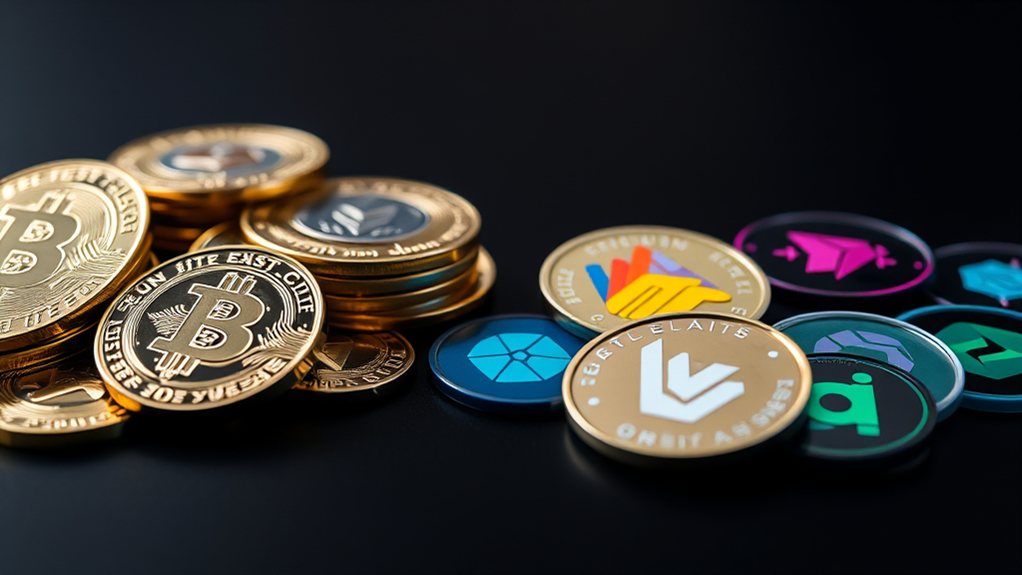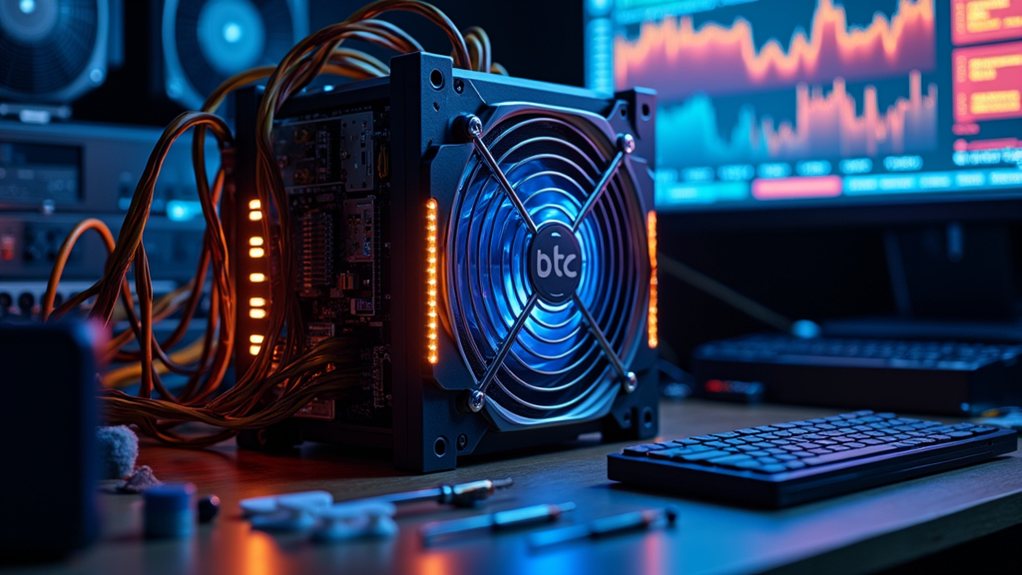Coins are native currencies of their own blockchains like Bitcoin and Ethereum. Tokens, however, piggyback on existing blockchains through smart contracts—think BAT on Ethereum. Big difference? Creation method. Coins require building an entire blockchain; tokens just need some code on an established platform. Purpose separates them too: coins function as digital money while tokens can represent assets, rights, or utilities. The regulatory world treats them differently as well.

Confusion reigns in the crypto world. People throw around terms like "coins" and "tokens" as if everyone knows the difference. Newsflash – they don't. The distinction matters, though. Coins are native to their own blockchains. Bitcoin, Ethereum, Litecoin – all coins. Tokens, meanwhile, are the guests at the blockchain party. They're built on existing platforms. Think BAT or LINK, both riding on Ethereum's infrastructure.
The technology behind each is fundamentally different. Coins require developers to build an entire blockchain from scratch. That's no small feat. Tokens take the easier route, created through smart contracts on established chains. No need to reinvent the wheel.
Coins typically employ proof-of-work or proof-of-stake consensus mechanisms. Tokens just leverage whatever system their host blockchain uses. Both rely on distributed ledgers, recording every transaction across countless computers.
Purpose separates them too. Coins function primarily as currency – digital money, plain and simple. Tokens have broader ambitions, representing assets, access rights, or utility within applications. Bitcoin wants to be digital gold. A token might represent ownership in a project or enable features in a decentralized application. Different beasts entirely.
Creation methods couldn't be more distinct. Coins emerge through mining or minting based on consensus rules. Someone had to fire up expensive equipment just to generate that Bitcoin. Tokens? A company issues them, sometimes with a few lines of code.
Coin supply often comes with hard caps – only 21 million Bitcoins will ever exist. Token supplies vary wildly depending on issuer whims. ERC-20 tokens are specifically built on Ethereum, representing the most common standardized token format in the crypto space.
The regulatory landscape gets complicated fast. Coins typically get classified as commodities. Tokens often trigger securities regulations, especially if they promise investment returns. Regulators care differently about each. For coins, they focus on exchanges and taxes. For tokens, it's all about protecting investors from scams. Unlike traditional fiat currencies, cryptocurrencies operate without central bank control, giving them unique regulatory considerations.
Market dynamics show the divide too. Coins dominate in market capitalization. Bitcoin alone dwarfs most tokens combined. But tokens? Volatile as hell. Some moon overnight; others crash just as fast. A coin's value links directly to adoption of its network. Tokens rise and fall with their associated projects. When storing your crypto assets, you might need both hot and cold wallets depending on which types you own and your security preferences.
Some blur the lines. Dogecoin started as a token but evolved into its own coin. Binance Coin made the same shift. Stablecoins exist in both forms. The crypto world isn't big on rigid categories.
But understanding the difference between coins and tokens matters. It's the difference between building a highway and opening a store on an existing one.
Frequently Asked Questions
Can Coins and Tokens Be Used Interchangeably for Payments?
Coins and tokens aren't perfectly interchangeable for payments.
Sure, both can transfer value, but coins—native to their own blockchains—generally enjoy wider merchant acceptance.
Tokens? They're pickier, often limited to specific ecosystems.
Platform compatibility issues exist.
Liquidity varies wildly.
Some exchanges won't even let you swap between the two.
Regulatory headaches complicate matters further.
Different integration complexities.
Different volatility profiles.
Not exactly a seamless experience.
How Do Security Regulations Differ for Coins Versus Tokens?
Security regulations hit tokens way harder than coins.
Most tokens get caught in the SEC's Howey Test dragnet as investment contracts. Classic securities stuff.
Coins? They're usually seen as commodities or currencies.
Bitcoin doesn't promise returns – it's just digital money.
Tokens, though? They're often tied to projects promising the moon.
Different regulatory worlds. One's about money transmission, the other's about investor protection.
Which Is Better for Investment: Native Coins or Tokens?
Neither is "better" for investment.
Native coins offer stability and liquidity, while tokens provide higher growth potential but with increased risk. It depends on investor goals. Some prefer Bitcoin's established network, others chase the next big token moonshot.
Markets don't play favorites. Smart investors diversify between both.
Reality check: both can make you rich or broke overnight. Crypto's wild like that.
Can Tokens Eventually Evolve Into Standalone Coins?
Yes, tokens can evolve into standalone coins. It happens through a process called "token swap" or "mainnet launch."
Projects like Cardano, Tron, and EOS all made this change. They started as tokens on Ethereum, then developed their own blockchains.
Not easy though. Teams face technical hurdles, security concerns, and potential market chaos during migration.
But the payoff? Greater scalability, customization, and independence from the host blockchain's limitations. Many ambitious projects plan this from day one.
How Do Transaction Speeds Compare Between Coins and Tokens?
Transaction speeds vary drastically.
Coins typically run slower – Bitcoin's measly 7 TPS can't compete with Solana tokens' blazing 65,000 TPS. Why? Coins need their own blockchain infrastructure. Tokens piggyback on existing networks. It's simple math.
Network congestion matters too.
ERC-20 tokens get dragged down by Ethereum's limitations. Meanwhile, Ripple stands out among coins at 1,500 TPS. Fast blockchains = fast tokens. Period.








